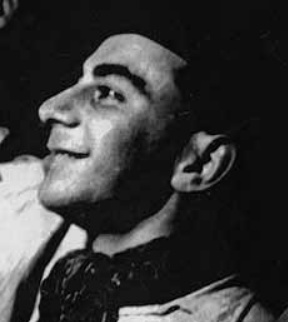Karel Švenk on:
[Wikipedia]
[Google]
[Amazon]
 Karel Švenk, sometimes referred to in German as Karl Schwenk (
Karel Švenk, sometimes referred to in German as Karl Schwenk (
 Karel Švenk, sometimes referred to in German as Karl Schwenk (
Karel Švenk, sometimes referred to in German as Karl Schwenk (Prague
Prague ( ; cs, Praha ; german: Prag, ; la, Praga) is the capital and largest city in the Czech Republic, and the historical capital of Bohemia. On the Vltava river, Prague is home to about 1.3 million people. The city has a temperate ...
, 17 March 1917 – near Karlsberg, en route to Mauthausen, 1 April 1945), was a Czech cabaret artist, comedian, songwriter and writer. A leading figure in the cabaret at the Theresienstadt Ghetto, Svenk was eventually sent to Auschwitz
Auschwitz concentration camp ( (); also or ) was a complex of over 40 concentration and extermination camps operated by Nazi Germany in occupied Poland (in a portion annexed into Germany in 1939) during World War II and the Holocaust. It con ...
and later to Meuselwitz. He died on a death march from Kraslice about two weeks before the end of the war. Being completely exhausted and unable to continue, his friend hid him in the straw in the barn where the prisoners spent the night. It is unknown whether he died of exhaustion or was discovered by the SS and shot.
Karel's parents were Rudolf Schwenk (1880-1944) and Klara Koráleková (1882-1944), both were killed in Auschwitz concentration camp presumably shortly after their arrived on 9 October 1944. Karel had three sisters - Erna, Lili, Ottilie as well as a younger brother Otta. Only Ottilie survived the holocaust and emigrated to the US with her husband Rudolf Wenzel Köegler and son Heinrich Frederick Köegler. Ottilie died on 9 April 1996 in Ramsey County, Minnesota.
Biography
Švenk was one of the members of the avant-garde ''Klub zapadlých talentů'' (German "Klub der ungenützten Talente", "Club of Wasted Talents") in Prague. He was one of the first artists to be deported to Terezín on November 24, 1941, and was among the 342 young Jewish men sent to prepare the previously non-Jewish camp for the Jewish inmates to follow. In the autumn of 1942 he appeared in passing in the propaganda film '' Theresienstadt. Ein Dokumentarfilm aus dem jüdischen Siedlungsgebiet'', standing with the puppeteer Otto Neumann and the dancer Kamila Rosenbaumová. Svenk was sent toAuschwitz
Auschwitz concentration camp ( (); also or ) was a complex of over 40 concentration and extermination camps operated by Nazi Germany in occupied Poland (in a portion annexed into Germany in 1939) during World War II and the Holocaust. It con ...
, then to Meuselwitz. He died on a death march from Kraslice about 2 weeks before the end of the war. Totally exhausted and unable to continue he was hidden by his friend in the straw of the barn where he and the rest of the prisoners spent the night. It is not known whether he died of exhaustion or was discovered by the guards and shot.
Theater
While in Theresienstadt, Švenk wrote ''Der letzte Radfahrer'' (''The Last Cyclist''), a comic satire of the Nazis based on the premise that some inmates had escaped from the insane asylum and decided the cyclists were the cause of the world's troubles. The show was never performed, as it was banned by the Jewish Council of Elders, but it did reach a dress rehearsal. The script was partially preserved by Jana Šedova, who played one of the romantic leads in the original. Some set and costume designs of the show also survived. The play was reconstructed by playwright Naomi Patz, and in 2017 it played at La MaMa. A film of that production, directed by Edward Einhorn, was broadcast on WNET Channel 13, aPBS
The Public Broadcasting Service (PBS) is an American public broadcasting, public broadcaster and Non-commercial activity, non-commercial, Terrestrial television, free-to-air television network based in Arlington, Virginia. PBS is a publicly fu ...
affiliate, as part of Theater Close Up, in 2022.
Music Compositions
* "Die verlorene Essensmarke" (The Lost Ration Ticket) withRafael Schächter
Rafael Schächter (born 25 May 1905, died on the death march during the evacuation of Auschwitz in 1945), was a Czechoslovak composer, pianist and conductor of Jewish origin, organizer of cultural life in Terezín concentration camp.
Life
H ...
* "Vsechno jde!" (Anything Goes!) "Theresienstädter Marsch" ("Terezin March") - a secret camp anthem, and his best-known composition.
* "Why Does the White Man Sit in the Front of the Bus?" - this was composed in Terezin and preserved by George Horner (musician) George Horner (Přerov, September 15, 1923 - April 23, 2015) was a Czech born pianist and later cardiopulmonologist at Lankenau Medical Center in Wynnewood, Pennsylvania.
Biography
In 1942, Horner his parents and sister were sent to Terezin, the " ...
one of the Terezin cabaret musicians. It was later arranged by David Post and recorded by the Hawthorne String Quartet
The Hawthorne String Quartet is an American string quartet, all four of whose members are players from the Boston Symphony Orchestra. Although its repertoire ranges from the 18th century to contemporary works, the ensemble specializes in works by c ...
with Thomas Martin, clarinet.
* "Pod destnikem" (Under an Umbrella) - recorded on Terezín - Theresienstadt (Anne Sofie von Otter album)
Terezín (; german: Theresienstadt) is a town in Litoměřice District in the Ústí nad Labem Region of the Czech Republic. It has about 2,800 inhabitants. It is a former military fortress composed of the citadel and adjacent walled garrison town ...
References
{{DEFAULTSORT:Svenk, Karel 1917 births 1945 deaths Theresienstadt Ghetto prisoners Czech people who died in the Holocaust